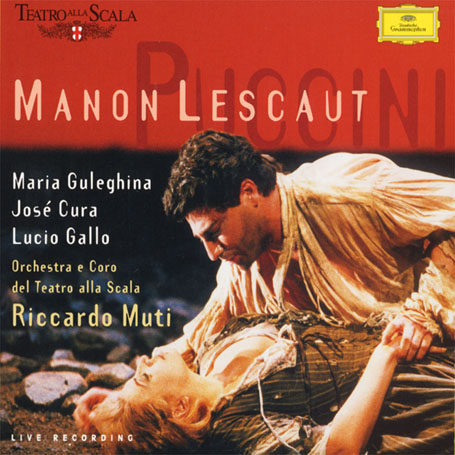Puccini Manon Lescaut
Caught live from the stage of La Scala, Riccardo Muti directs an exciting version of an opera that falls short on subtlety
View record and artist detailsRecord and Artist Details
Composer or Director: Giacomo Puccini
Genre:
Opera
Label: DG
Magazine Review Date: 5/2000
Media Format: CD or Download
Media Runtime: 159
Catalogue Number: 463 186-2GH2

Tracks:
| Composition | Artist Credit |
|---|---|
| Manon Lescaut |
Giacomo Puccini, Composer
Ernesto Gavazzi, Lamplighter, Tenor Ernesto Panariello, Captain, Bass Giacomo Puccini, Composer Gloria Banditelli, Singer, Mezzo soprano José Cura, Des Grieux, Tenor Lucio Gallo, Lescaut, Baritone Luigi Roni, Geronte, Bass Marco Berti, Edmondo, Tenor Maria Guleghina, Manon Lescaut, Soprano Mario Bolognesi, Dancing Master, Tenor Milan La Scala Chorus Milan La Scala Orchestra Orazio Mori, Innkeeper, Bass Riccardo Muti, Conductor, Bass Silvestro Sammaritano, Sergeant, Bass |
Author: Michael Oliver
Manon Lescaut has been fortunate in the recording studio. Apart from three older recordings featuring Maria Callas, Renata Tebaldi and Licia Albanese, there are six modern versions, none of which can be dismissed. In two of them Mirella Freni is the vivid and touching heroine. Decca's version is the beefier, both on Luciano Pavarotti's account (golden tone, but a bit too much of it, sensitively though he projects the text) and James Levine's. Giuseppe Sinopoli is subtler and Placido Domingo's Des Grieux is beautifully sung and movingly acted. Both are capitally cast throughout. Bruno Bartoletti's more routine account has a younger, less stylish Domingo, but Montserrat Caballe's Manon is exquisite. Similarly recommendable primarily on the soprano's account is Nina Rautio's sensitive Manon for Lorin Maazel, while Kiri Te Kanawa's, the quality of the voice itself deeply affecting, is conducted with real spirit by Riccardo Chailly; Jose Carreras is the ardent Des Grieux. Alexander Rahbari's Naxos recording is worth considering for reasons other than its super-budget price: Miriam Gauci in particular is a vulnerable Manon.
In this new recording Guleghina is a vibrant, Slavic, exciting heroine, but her voice lacks purity and at times steadiness. She is a spinto soprano in a role that seldom requires spinto heft, and what it does require ('con semplicita e modestemente' at her first entry, 'con la massima civetteria' in Act 2) she is hardly qualified to provide. Her suffering in Acts 3 and 4 is expressed with more vehemence than pathos. Cura sings throughout with great vocal splendour, but with hardly a trace of elegance or poetry. It is typical of him that at the end of the Act 1 duet ('Vinta tristezza dall'amor sara') he both insensitively ignores Puccini's piano marking and thereby robs himself of the ability to make the crescendo molto demanded three bars later. As Lescaut, Lucio Gallo demonstrates a fine baritone, and he acts well; in a studio recording he would no doubt have used less voice to even greater effect. Luigi Roni's voice is plummy and worn; appropriate to a character called Geronte, you might think, but Puccini specifies a basso brillante. Muti conducts with great passion and much finely calculated rubato, but the recording is a touch coarse in tuttis; bringing the voices forward into a studio rather than a theatre perspective has brightened the chorus, who overwhelm the orchestra in the Act 3 roll-call.
Apart from the recordings mentioned above one older one stands out as hors concours: Callas with Serafin, fascinating throughout, unbearably moving in Act 4, with di Stefano outstandingly sympathetic as Des Grieux. The newcomer offers plentiful vociferous excitement, but in an opera that seldom calls for it.'
In this new recording Guleghina is a vibrant, Slavic, exciting heroine, but her voice lacks purity and at times steadiness. She is a spinto soprano in a role that seldom requires spinto heft, and what it does require ('con semplicita e modestemente' at her first entry, 'con la massima civetteria' in Act 2) she is hardly qualified to provide. Her suffering in Acts 3 and 4 is expressed with more vehemence than pathos. Cura sings throughout with great vocal splendour, but with hardly a trace of elegance or poetry. It is typical of him that at the end of the Act 1 duet ('Vinta tristezza dall'amor sara') he both insensitively ignores Puccini's piano marking and thereby robs himself of the ability to make the crescendo molto demanded three bars later. As Lescaut, Lucio Gallo demonstrates a fine baritone, and he acts well; in a studio recording he would no doubt have used less voice to even greater effect. Luigi Roni's voice is plummy and worn; appropriate to a character called Geronte, you might think, but Puccini specifies a basso brillante. Muti conducts with great passion and much finely calculated rubato, but the recording is a touch coarse in tuttis; bringing the voices forward into a studio rather than a theatre perspective has brightened the chorus, who overwhelm the orchestra in the Act 3 roll-call.
Apart from the recordings mentioned above one older one stands out as hors concours: Callas with Serafin, fascinating throughout, unbearably moving in Act 4, with di Stefano outstandingly sympathetic as Des Grieux. The newcomer offers plentiful vociferous excitement, but in an opera that seldom calls for it.'
Discover the world's largest classical music catalogue with Presto Music.

Gramophone Digital Club
- Digital Edition
- Digital Archive
- Reviews Database
- Full website access
From £8.75 / month
Subscribe
Gramophone Full Club
- Print Edition
- Digital Edition
- Digital Archive
- Reviews Database
- Full website access
From £11.00 / month
Subscribe
If you are a library, university or other organisation that would be interested in an institutional subscription to Gramophone please click here for further information.




